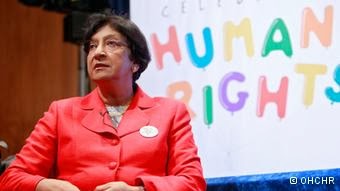 |
| UK strongly support Pillay’s position |
Feb 26, London: Britain is regularly discussing Sri Lanka with a range of international partners ahead of the UN Human Rights Council session and will continue to press the Sri Lankan Government for credible, transparent and independent investigations into alleged war crimes during the last stages of the conflict, a British minister said. Speaking at the debate in the UK parliament on Monday, the British Minister of State at the Foreign and Commonwealth Office (FCO) Hugo Swire said Britain does not believe that the domestic processes set up by the Sri Lankan government are adequate to address the humanitarian law violations and accountability issues.
He said Britain had made it clear to Sri Lanka that if a credible domestic process has not begun properly by March 2014, the UK will use its seat on the UN Human Rights Council to call for an international investigation.
According to Swire, Britain continues to be concerned about the lack of credible, transparent and independent investigations into alleged violations on both sides of the Sri Lanka conflict.
The report by the UN High Commissioner for Human Rights Navi Pillay due ahead of the March Human Rights Council will provide an assessment of Sri Lanka’s progress, Swire added.
The UN High Commissioner for Human Rights Navi Pillay made her report public on Monday.
Swire said the UK strongly support Pillay’s position that if Sri Lanka has not demonstrated a credible national accountability process by March 2014, then the international community has a duty to act.
“We have made clear if the Sri Lankan Government has not begun properly with credible investigations by March, then we will use our position on the UN Human Rights Council to work with the UN Human Rights Commissioner and call for an international investigation,” he told the UK assembly.
When asked about the UK’s assessment on a report by the French NGO, Action Contre le Faim (ACF) International, on the murder of 17 aid workers of the organization in 2006 at the height of the war in the Eastern Province of Sri Lanka, Swire said the UN High Commissioner for Human Rights observed there has been “relatively little progress” in the case when reporting to the UNHRC in September 2013 and the UN High Commissioner’s view was reinforced by the 3 December ACF report.
The Sri Lankan Government has recently stated that investigations are ongoing; it is important that progress is made in identifying and bringing to justice the perpetrators, the Minister noted.
When asked about the progress that has been made on the establishment of an independent investigation into war crimes and crimes against humanity in Sri Lanka, Swire replied that the Britain does not believe the domestic mechanism set up by Sri Lanka was adequate.
He told the assembly that the UN High Commissioner following her visit to Sri Lanka last year has said that she had detected ‘no new or comprehensive effort’ to investigate the allegations.
“We share the High Commissioners concerns and do not believe that processes set up by the Sri Lankan Government, such as the Lessons Learnt and Reconciliation Commission or the Commission of inquiry on Disappearances announced last year, adequately address accountability.”
“If credible domestic investigations have not begun properly by March 2014, the Prime Minister has been clear that we will use our position on the United Nations Human Rights Council to work with the UN High Commissioner for Human Rights and other countries to call for an international investigation,” Swire reiterated.